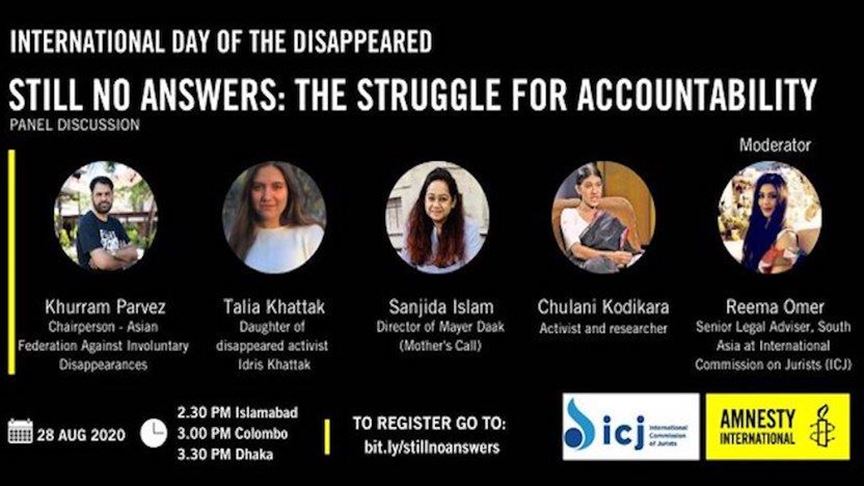'Enforced disappearances not legal issue but political'
'Globalization of responsibility' needed to halt enforced disappearances, says global rights advocate

ANKARA
Experts and activists in South Asia speaking at a virtual conference have asserted that enforced disappearances were a political issue that demanded a "globalization of responsibility".
Participating in the webinar hosted on Friday by Amnesty International South Asia titled Still no answers: The Struggle for Accountability, Chulani Kodikara -- a rights advocate from Sri Lanka -- said: "We need to think about enforced disappearances, not as a legal issue but as a political issue."
"If you look at Sri Lanka's Transitional Justice process after the war, there has been an immense amount of international pressure on the state, on both the Rajapakse and Sirisena/Wickramasinghe governments," Kodikari said during the event held in collaboration with the International Commission of Jurists.
Mahinda Rajapaksa, Maithripala Sirisena, and Ranil Wickremesinghe led respective Sri Lankan governments during and after an ethnic war in northern Jaffna from the 1990s to the late 2000s, during which the government allegedly committed many human rights violations.
Agreeing with Kodikara that international pressure works, international rights defender Khurram Parvez from the Indian-administered Kashmir said most countries believed that the international community "has no role to play in domestic human rights issues."
"This has not been challenged by the international community in an effective way. Globalization of responsibility is something that needs to be talked about," said Parvez, who leads Asian Federation Against Involuntary Disappearances.
Talia Khattak, whose father has been missing in Pakistan since last November, said: "I've been hearing the term 'missing persons' since I was a child. Then my father became a missing person. You're living a normal life and one day a family member is just gone. You feel like you don't deserve to be happy."
"I want accountability. They have committed a crime. Each family needs to be given answers. Each family deserves compensation," she added.
Parvez, who received the 2006 Reebok Human Rights Award, said: "Prosecutions alone will create some amount of deterrence for enforced disappearances. Soldiers will be scared."
No forcible disappearances
According to Kodikara, at least 100 people have disappeared after surrendering to the Sri Lankan army since the end of the war in 2009.
Noting that these surrenders had been registered by the government, she said establishing accountability over the matter has been challenging, with the culprits largely going unpunished.
"We need to ask the question of how in a functional democracy so many people can be disappeared and how society is complicit," she said, adding that another difficulty in Sri Lanka was that the armed forces had been "constructed as heroes" by a political discourse that has been hard to challenge.
Despite these difficulties, Parvez said people "refuse to give up" in their struggle.
"They want to know the answers and the memories of their loved ones keep them going," said Parvez, a program coordinator at the Jammu Kashmir Coalition of Civil Society, also referring to the "Machil fake encounter 2010" in Jammu and Kashmir.
Nearly 8,000 people are alleged to have been forcibly disappeared in the Indian-administered Kashmir since the early 1990s. Three innocent people were killed by Indian forces in the Machil area along the Line of Control in the disputed region.
"These countries will have to begin the processes of change. And we have to live with the fact that these will be incremental changes. Governments will not become benevolent overnight and we have to make sure we don't forget what we want," Parvez noted.
Sanjida Islam, an opposition activist from Bangladesh, told the webinar: "When we started campaigning as a victim family, we were terrified. Even when other families joined us -- they would worry about their safety for speaking up."
Parvez asserted that even if a person is associated with a militant organization "they must not be disappeared."
"The process of shaming these countries [involved in forcible disappearances] will start a process of accountability," added Parvez.
'Impunity must end'
In a separate statement, Cynthia Veliko, the Southeast Asian regional representative of the UN Human Rights Office in Bangkok, urged for an end to enforced disappearances and other crimes in Southeast Asia.
"Strong commitments are needed by States to achieve that goal through adopting domestic legislation that meets international norms and standards and by fully implementing the Convention [for the Protection of All Persons from Enforced Disappearance], including establishing appropriate domestic institutional mechanisms to investigate allegations of disappearances."
Urging Southeast Asian nations to criminalize enforced disappearances and ratify the convention, Veliko added: "Impunity for this horrific act must end. Timely and credible investigations must be undertaken, the perpetrators must be identified and brought to justice and families provided the right to reparation."
"There should be no further delays in making this a punishable offense in every country together with legal standards that ensure full disclosure, transparency and accountability for all persons deprived of their liberty."



